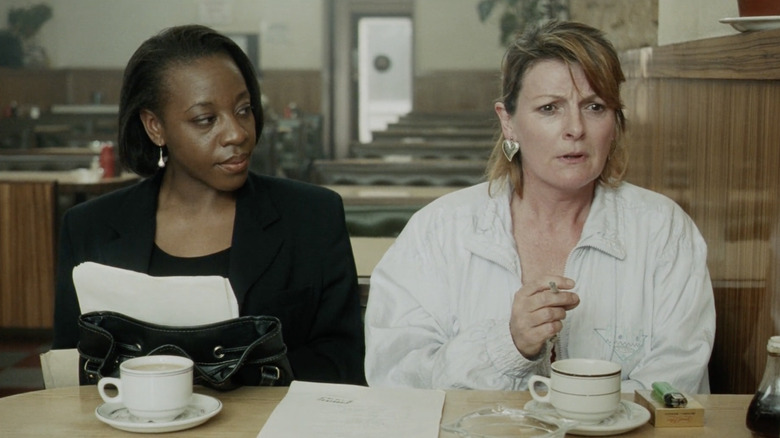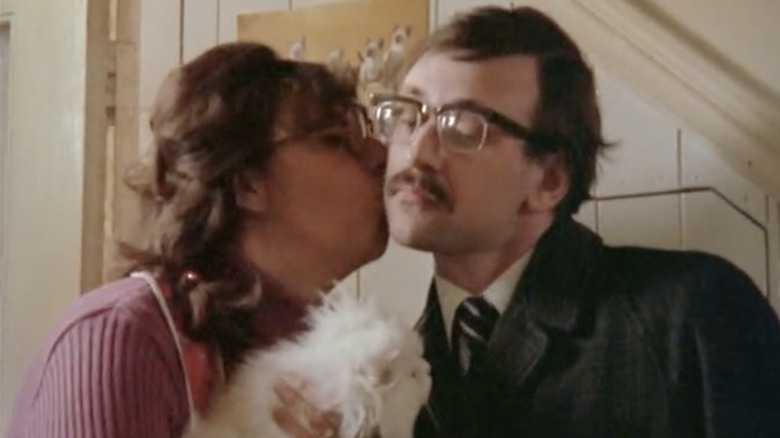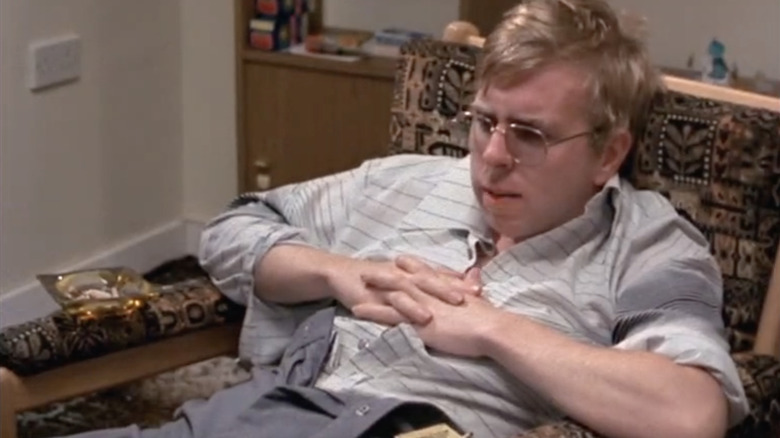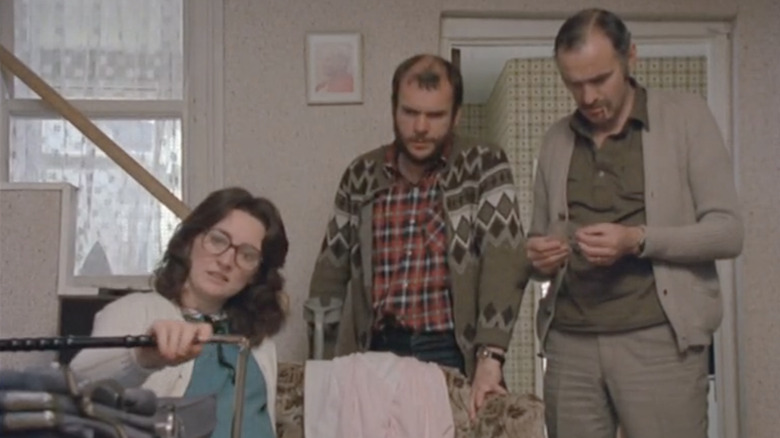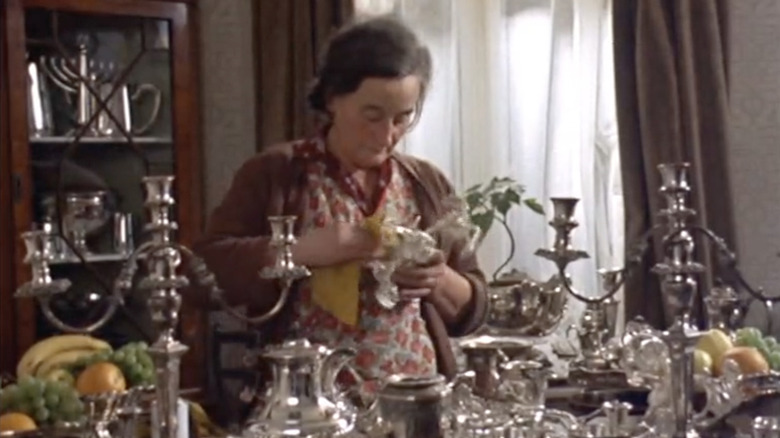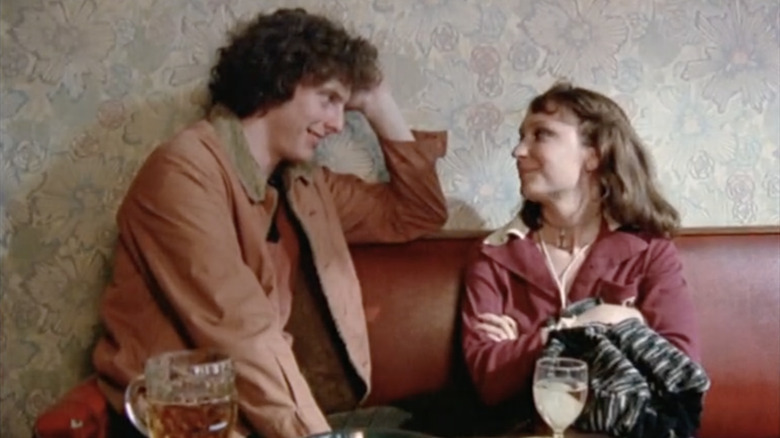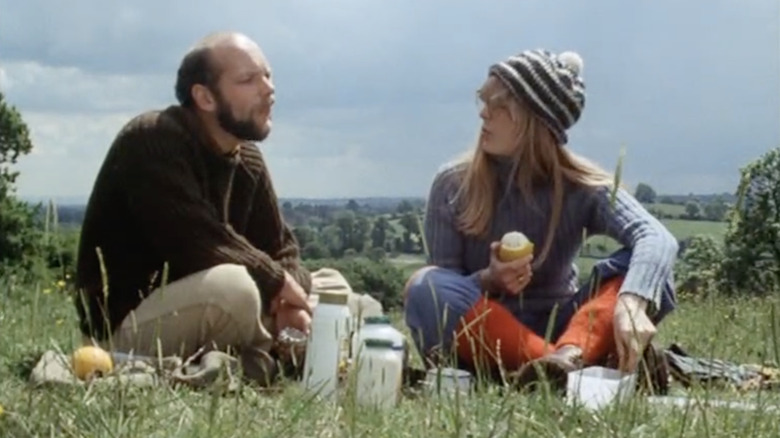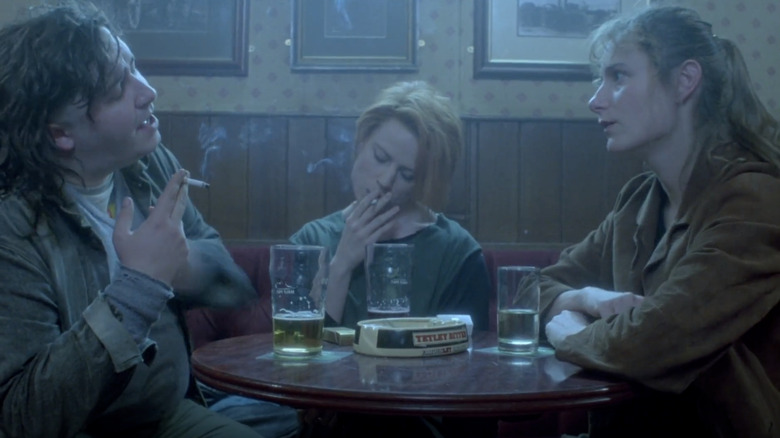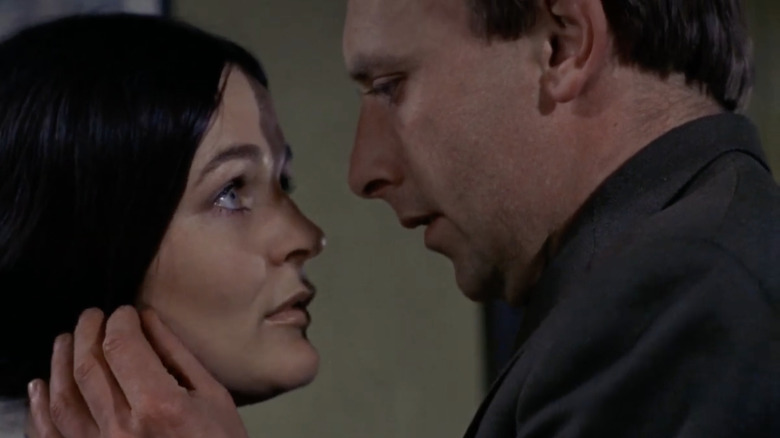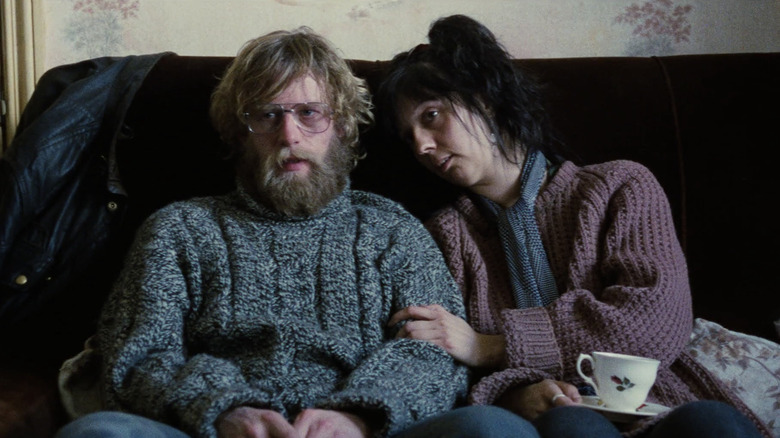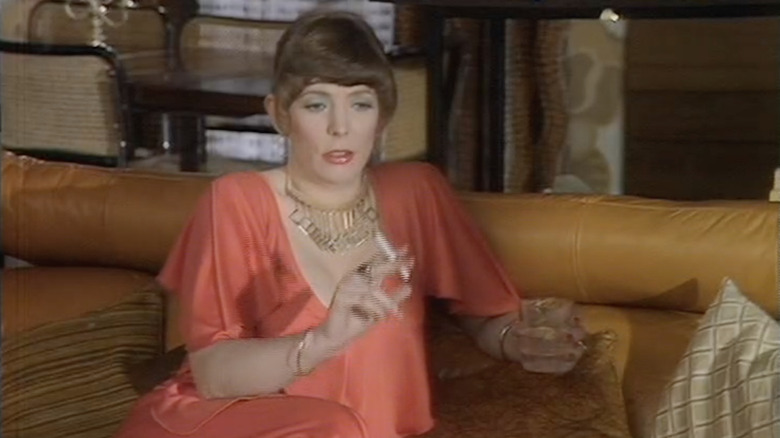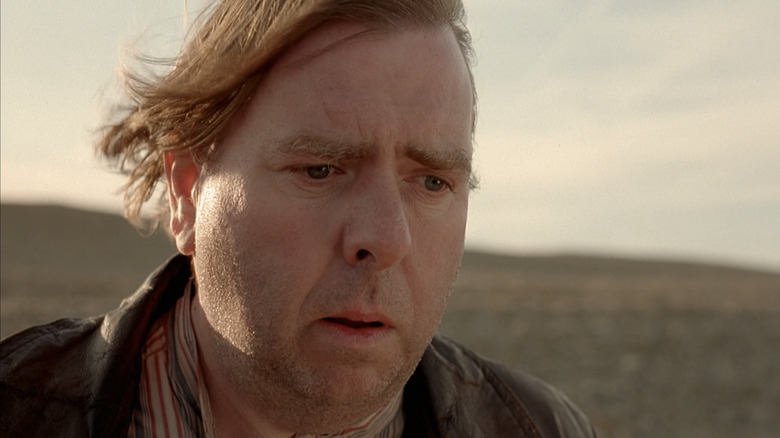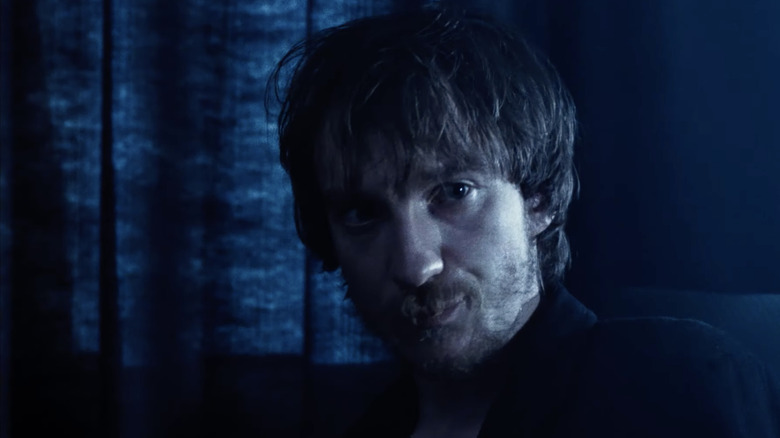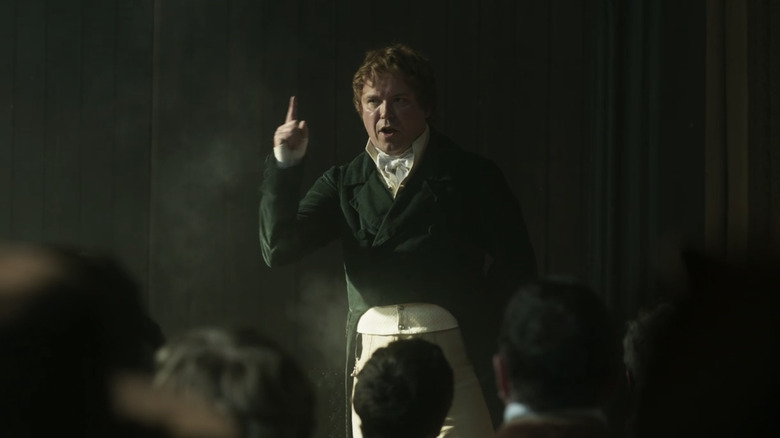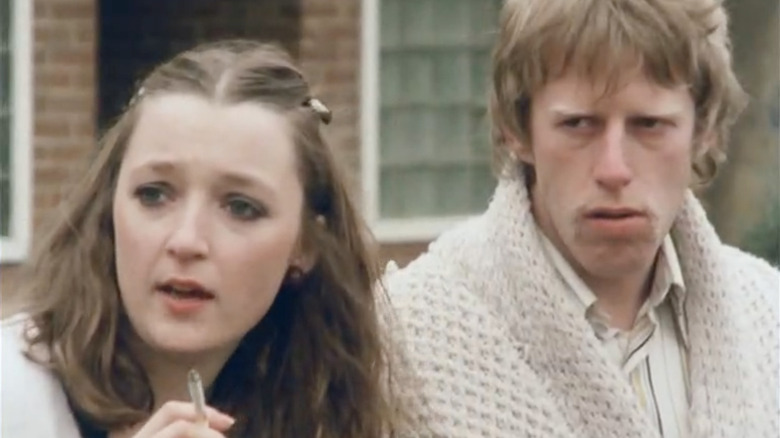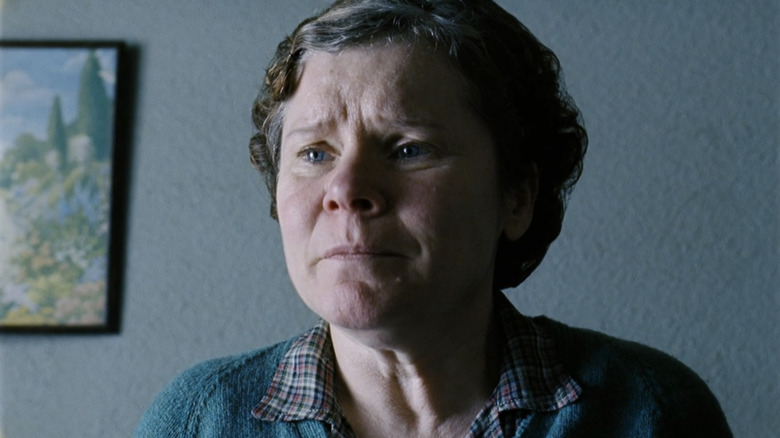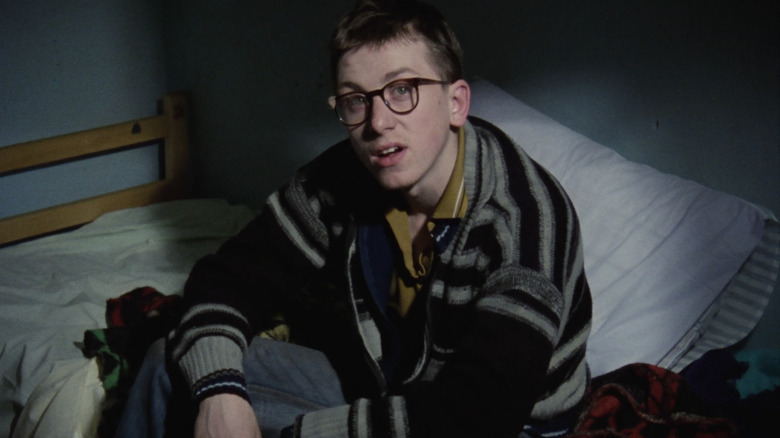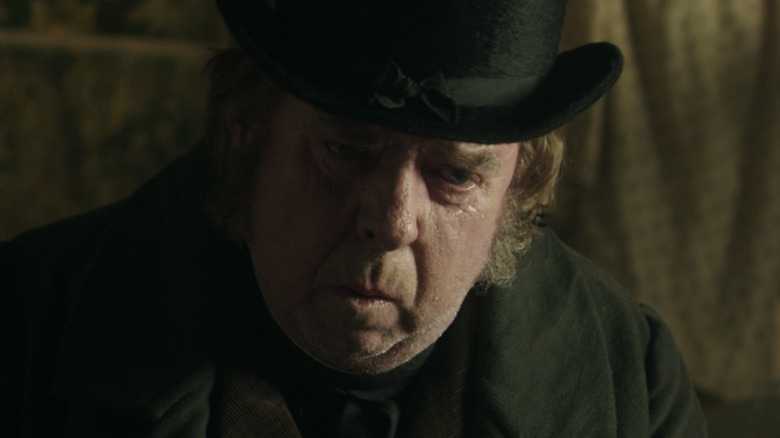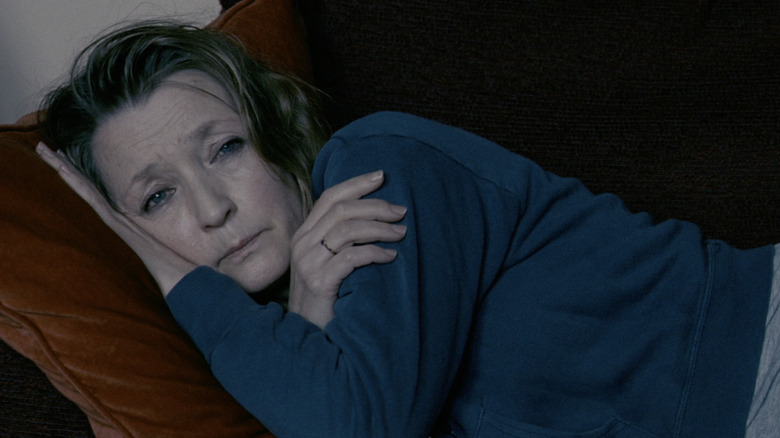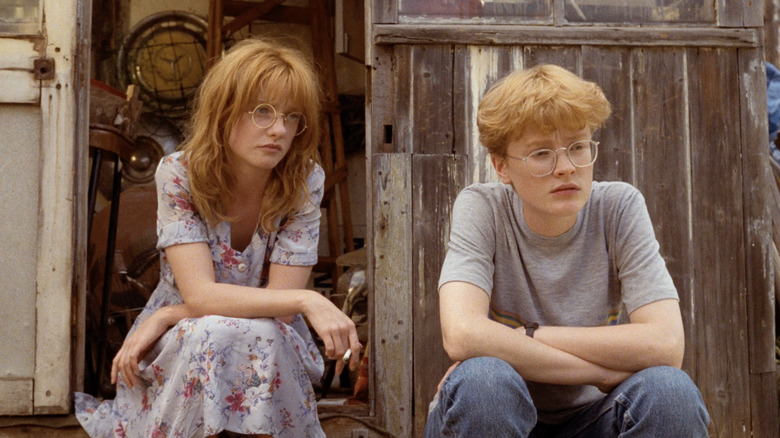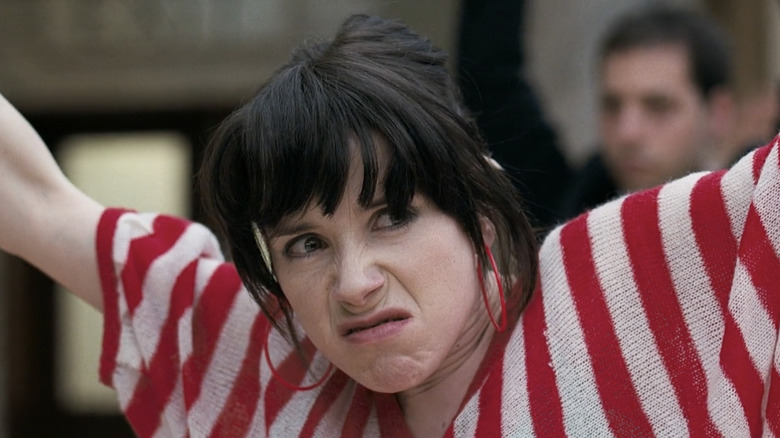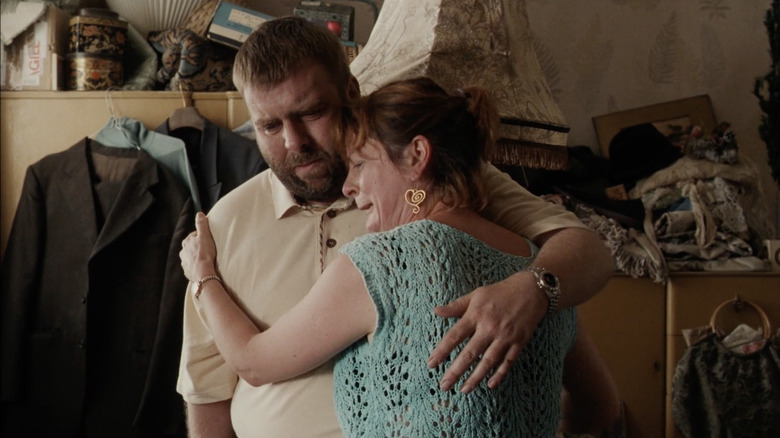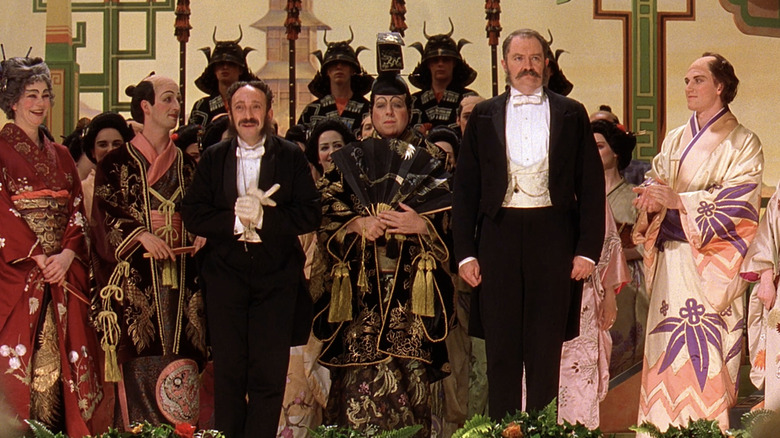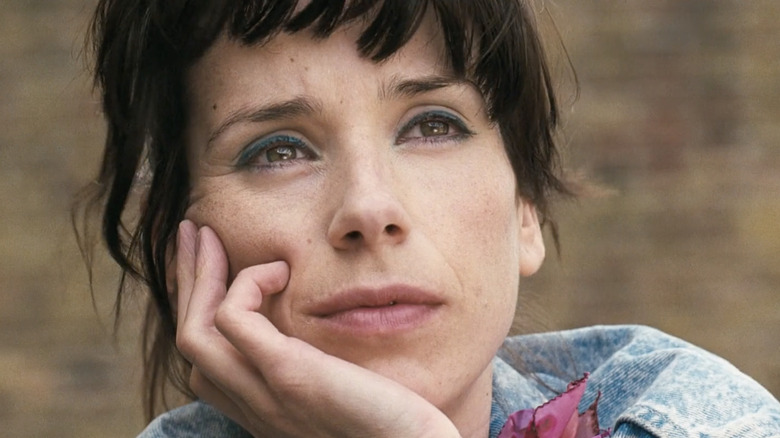Every Mike Leigh Film Ranked
For me, one of the most depressing cinematic news stories in recent memory was Mike Leigh revealing that he has not been able to find someone willing to fund his next project. Even though theatrical moviegoing for small dramas for adults has basically gone the way of the dodo, one would hope in the streaming era that smaller-scale projects would be more feasible, but this has not been the case for Leigh. The man has been nominated for seven Academy Awards, 13 BAFTAs, and won the Palme d'Or and Best Director at the Cannes Film Festival over the course of his 50+ year career, but now, he can't get a movie made.
Mike Leigh would be on my Mount Rushmore of directors. No one makes movies like him. And I mean that. His methodology of building characters with his actors and placing them into extensive improvisations and rehearsals to develop the story is a wholly unique one, creating a bevy of humanity unparalleled by any other filmmaker. He often will craft stories about people society has cast out based on their class, behavior, or mentality. Over his career, he has created an incredible troupe of artists he continues to work with time and time again, whether that be bigger names like Jim Broadbent, Lesley Manville, and Timothy Spall or equally tremendous lesser-known character actors like Alison Steadman, Martin Savage, and Ruth Sheen. These are performers rarely afforded the opportunity to play multidimensional leading roles in films because they aren't certified box office draws, but Leigh's work gives these extraordinary talents a place to shine.
I want to celebrate this man's work. I want to plead with all the movie studios to give Mike Leigh money for future films. I want to shout from the mountaintops to every single person who has not seen a film by Mike Leigh to check one (or all) of them out. Each of his films should be an event on par with the Scorseses and Nolans of the world, yet his name is rarely mentioned in that category of auteur. Let's comb through all 22 of Leigh's feature films to see what makes his work stand apart from the pack, how he consistently taps into the troubles of everyday people, and why no one can replicate a Mike Leigh film.
22. Who's Who (1979)
In the 1970s and '80s, the independent British film scene was not particularly thriving, especially for those not wanting to make low-budget genre fare. The only place people like Mike Leigh or Ken Loach could really find a screen home for his work was on television. Leigh directed nine features for the small screen, most of them installments in the BBC's "Play for Today" series. They may be shot on videotape and not have the greatest production value, but each one is still unequivocally a Mike Leigh project. The least successful of his works is his penultimate "Play for Today" entry entitled "Who's Who."
Most of Leigh's films concern working-class folks, where the weight of the world rests on their shoulders trying to get from day to day. In "Who's Who," he set his satirical sights on the upper class, as well as the middle class who idolize the upper class. Alan (Richard Kane) works in a brokerage firm and has an obsession with the lineages of Britain's elite, collecting autographed memorabilia from people like Margaret Thatcher, and constructing his own giant family tree of the country. If he encounters someone with money, he desperately tries to seem like he is in the club. He and his wife April (Joolia Cappleman) are juxtaposed with the young, nepotistic executives from his company throwing their own dinner party, foolishly worrying about things like who sits next to who at the dinner table.
While Leigh's comedic eye is incredibly strong here, the reason it falls to the bottom of the list is that the characters here feel like cartoons; punching bags for our amusement. Leigh has always been a filmmaker with a tremendous amount of empathy for every single character in his movies, and that is just missing in "Who's Who." There are quite a lot of laughs to be had, don't get me wrong, but as a whole, it feels more hollow than everything else on this list.
21. Home Sweet Home (1982)
Leigh's final installment for "Play for Today" (he would still make two more films for television, just not under that banner) puts us in the world of people that are his bread and butter. "Home Sweet Home" tackles the lives of three postal workers in Hertfordshire. Principally is Stan (Eric Richard), an absentee father to a teenage girl looking for any kind of connection with the various women he wants to (or does) sleep with, including the wives of his co-workers. His compatriots in the mailroom are Harold (Tim Barker), a kindly man with a propensity for bad jokes and riddles, and Gordon (Timothy Spall), a lazy man filled with an anger just waiting to burst. Stan is having an affair with Harold's wife June (Su Elliott) and tries to strike up a thing with Gordon's Hazel (Kay Stonham).
While it features many of the hallmarks of a Mike Leigh picture, this is the one movie where the characters he and his actors have created feel more like archetypes than people with a vast number of dimensions. This is particularly true of the women in the film, who fall into either the sad or angry housewife tropes. Imbuing these women with these traits is not inherently a bad thing, but they don't feel like they come from a particularly honest place. We only see their lives in relation to these men and not how they exist on a day-to-day basis, which is something Leigh always gives similar characters. Really, it is only Richard's Stan who gets to contain multitudes, probably because he is such a fleeting, wayward man. He gets to be full of contradictions because that is how he lives his life.
When Leigh does have all the stories come to a head, the results are undeniably gripping. The building confrontations stack on each other beautifully, even if the intentions behind them are not the most satisfactory. While Leigh is rightfully praised for his improvisatory development, what he captures on film has been thoroughly rehearsed and worked out. He is still a dramatist sculpting reality, not a vérité filmmaker. "Home Sweet Home" may not be the most impactful or insightful film of Leigh's career, but it still shows his storytelling skills.
20. Four Days in July (1984)
Mike Leigh makes movies about England. While many of our finest filmmakers travel the world when setting up their stories, Leigh is obsessed with the people from his native country. That is, except for one film: "Four Days in July." He really went far afield for this one. All the way to ... Northern Ireland. His final film for television, "Four Days in July" takes place over, naturally, four days in the seventh month of the year for two couples, both expecting a baby any minute. This being 1984 in Northern Ireland, the ideological rift of the Troubles has really taken hold. This is an environment where the religious and nationalistic clashes have been occurring for over a decade at this point, and the violence often shown in dramatic stories about the Troubles, such as Kenneth Branagh's "Belfast," could not be more backgrounded. Eugene (Des McAleer), an Irish loyalist, has been the victim of violence, be it gunshot wounds or bomb shrapnel, and walks using crutches, but the story is not about his clashes with the unionists. He and his wife Collette (Bríd Brennan) are about to have their first child and are nervous about how to raise it. The same goes for the unionist couple of Lorraine (Paula Hamilton) and Billy (Charles Lawson), a patrol officer for the Crown.
Leigh's sympathies clearly lie more with Eugene and Collette. He has openly been a republican throughout his entire life (in the abolishing the monarchy sense, not the politically conservative one) and finds much kinship in these two hoping for a free Ireland to raise their newborn child. It's not that he doesn't have empathy for Lorraine and Billy, but their inner turmoil about their forthcoming kid is not nearly as engrossing as the Catholics'. Brennan and McAleer feel like such a warm, beautiful couple, hoping for the best and good at putting smiles on their scared faces.
It would be interesting to see Leigh step out of his home country more often. Obviously, he wouldn't have the same experience to draw from when creating his other films, but having that Mike Leigh feeling transplanted to another culture of complicated human beings makes for a rather wonderful watch.
19. Hard Labour (1973)
"Hard Labour" was Leigh's first film for BBC's "Play for Today." While everything mentioned so far has been comprised of ensemble pieces, this film is much more focused on a singular character. Liz Smith takes on the role of Mrs. Thornley, who works as a housekeeper for the wealthy Mrs. Stone (Vanessa Harris). Mrs. Thornley is a quiet woman, subject to demands all around her, whether it's from her employer, her husband, her children, or anyone else. She feels the need to provide and care for everyone, and it's with good reason, as many would be lost without her. She never receives a word of thanks or gratitude, though, and you can just see her sink further with each new thing asked of her. She can't vocalize her feelings to anyone in her life, and the only place she can find that space is in a confessional, talking to a priest who isn't terribly concerned about her problems either. "Hard Labour" is a beautiful tribute to so many women like this. They put so much into the world and receive very little love back.
Leigh gives this film an extra layer of personal investment, shooting in his own hometown of Salford in Manchester. He even grew up just a few doors down from the house a lot of the film was shot. That observed reality permeates every frame of "Hard Labour." This film is probably the closest Leigh gets to just replicating reality, more concerned with capturing atmosphere than story. So, the dramatic stakes are not as robust or intricate as his best films are. Being so close to home, perhaps Leigh did not want to impose his own structure on it. While the character work in "Hard Labour" is gorgeous, it has to be low on the list because of a lack of dramaturgical inventiveness.
18. The Kiss of Death (1977)
For me, "The Kiss of Death" is the toughest Mike Leigh film to crack. In some ways, the film works as a gentler precursor/flip side to one of his most beloved films "Naked" (more on that later), centering on an extremely peculiar individual unconcerned with societal mores. Here, that is a young man named Trevor (David Threlfall), a mortician's assistant that takes socially awkwardness to a new level. He struggles to communicate with people, breaks off plans without a word, and often finds himself laughing uncontrollably at the most inopportune times. Trevor attempts to court Linda (Kay Adshead), who finds his erratic behavior often as charming as it is infuriating.
In another filmmaker's hands, Trevor could come off two very different ways: either someone with a serious mental illness to be pitied or a complete sociopath. Rarely does somebody like this get treated with as much empathy as they do here. Leigh never defines if he has any conditions of any kind (a working-class man in 1977 wouldn't even look to get it diagnosed anyway), but clearly, the way Trevor experiences the world differs vastly from everyone else in his life. People like this don't get stories told about them, and if they are, they are the villain or the punching bag. He is an enigmatic lead of an enigmatic film, and by the end, we never get any solid answers. I find "The Kiss of Death" the most frustrating Mike Leigh film to watch, but that frustration comes from a place of admiration. I want to understand it.
17. Nuts in May (1976)
While I find "Who's Who" lacking some humanity in its heightened, slightly cartoonish characters, that can be found in "Nuts in May." This is Leigh's examination and ribbing of middle-class, crunchy liberals. He is a big old lefty himself, but he does not have a ton of patience for self-important, performative liberalism. Alison Steadman and Roger Sloman play Candice Marie and Keith, a married couple on a camping trip. These are the kind of people obsessed with the nutritional information of every piece of food they eat and make up cute little songs about going to the zoo. They feel like the people who have developed their lifestyle based solely on reading magazine articles about healthy living, particularly the ultra-fastidious Keith. Things start to go awry when another camper (Anthony O'Donnell) pitches his tent within earshot and starts to crumble their serenity.
Leigh has a lot of fun mocking these people, for sure. Their concern over pasteurized milk or seeming knowledgeable about rocks and fossils makes for some terrific comedy. He also loves popping their insular, carefully crafted bubble, and watching Keith's brain break when another camper willingly wants to break a campsite rule about building a fire is both hilarious and terrifying. The scene where they perform their zoo song (which they accompany on the guitar and banjo) truly makes you want to crawl into a hole and die for how cringe-inducing it is. All that being said, Steadman and Sloman due imbue these characters with so much love and humanity that their quirks never feel like easy things to take potshots at. These are just everyday eccentrics going about their daily lives and wanting a nice camping holiday. When Keith does eventually burst into a rage, you actually are somewhat on his side in his bout of anger.
Ironically, "Nuts in May" came out a few years before "Who's Who," so this was more of a case of getting the right balance of satire and humanity right the first time rather than needing to refine it. "Who's Who" pushes things too far, and here, Leigh finds that sweet spot.
16. Career Girls (1997)
We finally get to our first theatrical feature from Mike Leigh on this list. "Career Girls" was his follow-up to the Palme d'Or winning "Secrets & Lies," which was a monumental deal in the independent and arthouse scenes. This film ... did not make nearly as much of a splash as its predecessor, which makes sense. "Career Girls" is not the emotional rollercoaster that "Secrets & Lies" is, complete with transcendent moments of emotion. This is a much smaller-scale story about drug addicts. It's tougher, grimier, and a bit unpleasant. The film takes place over the course of two timelines. First, we see a reunion of two old friends, Katrin Cartlidge as Hannah and Lynda Steadman as Annie, who haven't seen each other in six years and are both getting their lives together. This is intercut with scenes of their meeting and growing together as they both struggle with mental illnesses and drug addiction. Based on their behavior, they are hooked on meth, though not explicitly stated.
More than anything, this is a film about friendship, about the people you lean on and need in your darkest and most difficult moments. Katrin Cartlidge, who sadly died far too young a few years after this film was made, gives a performance for a lifetime. While David Thewlis in "Naked" rightly gets so much praise for his erratic, verbose performance, Cartlidge's Hannah is every bit his equal in "Career Girls." She also is able to perfectly draw the line between the past and the present in the two timelines seamlessly, despite the character evolving so much between the two. Steadman fares less well in flashback sections, overly selling the tweaks and twitches of her state that it becomes a little distracting. Then there's Mark Benton as their friend Ricky, giving an absolutely heartbreaking performance as someone who has been unable to overcome the problems Hannah and Annie have.
The only reason "Career Girls" falls to this place on the list is really because of Steadman's uneven performance. Almost everything here works exactly as it should, but because of that wobbliness, the full emotional power of this story of friendship can't completely come together. Of course, you may perceive Steadman's work here very differently, and it does all click. Among Leigh's theatrical work, this one is often forgotten, and it really should not.
15. Bleak Moments (1971)
Before he was roped into more than a decade of television work, Leigh did manage to make his directorial debut for a theatrical audience. This was an adaptation of a work he originally conceived for the stage called "Bleak Moments." Anne Raitt plays Sylvia, a young woman living with her sister who struggles with a variety of issues that require special care. Because of the sister, Sylvia often finds herself retreating from any kind of social life, though she does find herself walking with a man who lives nearby (Eric Allan) each morning to work. This is someone who she clearly is attracted to and interested in but does not really know how to act on it.
The major set piece of "Bleak Moments" is their date, which is filled with so much awkwardness and longing. Two people desperate to connect with one another but without the proper facility to make it all work. She cannot let herself go and fully enjoy something she knows she wants. In its own small way, it's a true tragedy that rips out your heart. Anne Raitt as Sylvia reels you into her head expertly and makes you understand every little decision and emotion she experiences. The rest of the film doesn't reach the heights of this extended sequence that takes up probably half the film, but the highs are so high that you can forgive the rest for not being as gripping.
Being Leigh's directorial debut, you can feel the lack of experience on the technical side. This is particularly true in the sound department, where sometimes the people are not recorded all that well, or there will be loud typewriters clacking away over dialogue that he has not ADR-ed to make clearer. As a storyteller, he comes almost fully formed after his previous decade in the theater. He just needed to better figure out the aesthetic components to film to match that, which he quickly learns. "Bleak Moments" certainly feels like a first film, but it is still better than a lot of directors' best works.
14. High Hopes (1988)
"High Hopes" was Leigh's first film post-television and, for many, the proper start to the career we love him for today. It tackles one of his favorite topics, the clashing of different social and economic classes, but instead of being inherent to the story of working-class people, "High Hopes" is filled with a ton of explicit political discussion. The central couple of the film are the working class Cyril (Phil Davis) and Shirley (Ruth Sheen). They could not be more outwardly disdainful of Britain's class structure and regressive policies under Margaret Thatcher. Shirley even names a cactus after the former Prime Minister. They live in an orbit where those of higher class exist. Cyril's mom (Edna Doré) lives in a neighborhood undergoing a lot of change and gentrification, with rich people showing up all around including new next-door neighbors played by Lesley Manville and David Bamber. His sister Valerie (Heather Tobias) recently married into some money and hopelessly tries to come off as someone who has been a member of the upper class all her life.
Mike Leigh tends to deal with class structures by dividing the film between different storylines. What he does not usually do is slam everyone into one space to see the differences right next to each other, which is what occurs in "High Hopes." One day, Cyril's mother, who is in the early stages of Alzheimer's or dementia, forgets her purse inside her home and is locked out, looking to her rich neighbors for help, which she seeks from her daughter. Cramming all three of these perspectives into this one house to bounce off one another makes for a lot of laughs without losing sight of the incisive commentary.
A lot of the movie does end up being these characters acting more as political mouthpieces than characters, but Leigh's work with his actors still makes the mouthpieces captivating. Phil Davis and Ruth Sheen are so immanently lovable that they make it work. "High Hopes" is a totally solid entry in the Mike Leigh canon, dealing with a lot of familiar territory for him that he has done better and worse before and since.
Also, the line, "Two steaks. Same day. Totally different," is just an absolute banger when delivered with the stiffest upper lip you can possibly imagine.
13. Abigail's Party (1977)
"Abigail's Party" brings us back to his "Play for Today" era of filmmaking. While every other work Leigh made for them was indeed a proper film, "Abigail's Party" is very much a filmed play, and until his theatrical movie career really started gaining steam, this was probably the piece he was most known for. Beverly (Alison Steadman) and Laurence (Tim Stern) are holding a small house party with a few neighbors. Like the main couple in "Who's Who," they are decidedly middle class, interested in putting on the heirs of the elite. Well, Laurence is anyway, flaunting his editions of the complete works of William Shakespeare and showing off the painting prints hanging on the walls. Beverly, on the other hand, wants to try and make her taste in things not considered high brow, like Tom Jones, seem more sophisticated than they are. They are in a constant push-pull in trying to control the tenor of the party.
The Abigail of the title is the name of the teenage daughter of one of the party guests, throwing a party of her own down the street, the thumping music of which acts as this subtle rumble throughout the entire play. While we never see that party, we can assume these teenagers are dancing, snogging, and having just a grand old time over there, while these miserable middle-aged folks we are watching try their best to seem adult.
Mike Leigh absolutely detests self-importance and looks to puncture that balloon any chance he can get. The characters in "Abigail's Party" are unquestionably heightened, probably some of the most heightened over the course of his career, but letting this be a filmed play rather than making a conventional film out of it makes for the right medium for the broad palette he is working with. There is no feigning reality here. It can be as constructed as it needs to be. This was the only time Leigh adapted one of his stage shows like this, and I wish it would have happened more.
12. All or Nothing (2002)
Mike Leigh had taken a major departure with "Topsy-Turvy" in 1999, where he tackled a world very different than most of his other films (more on that film later). "All or Nothing" was something of a return to form for the director, heading back to London's working class. While a lot of his films covering people like this can be quite bleak, none dive as much into depression as this one. "All or Nothing" follows the intertwining lives of three working-class families, filled with minicab drivers and supermarket clerks. The primary family has Leigh stalwarts Timothy Spall and Lesley Manville as a couple in just a tough spot. Spall's Phil, in particular, clearly feels the weight of the world holding him down and looking for an escape of some kind, be it just driving around or maybe even suicide. There's clearly love between the couple but life and their kids, James Corden and Alison Garland, just make it hard to find any moment to breathe.
The other families may not feel that weight as strongly, but there is a heaviness hovering over everything. Even the teenage love life of Samantha (Sally Hawkins, in her first proper film role) can't generate that many smiles, as it includes some stalking. Since it had been a minute since Leigh had created one of his signature kitchen sink dramas like this, "All or Nothing" can feel overwhelming at points with how much he crams into it, but I find myself drawn to the works where there's more to fit into than running time than stretching out the ones where there isn't much. Like "Career Girls," this film came after a big deal from Mike Leigh and was kind of swept under the rug. It really does not deserve that.
Look, Mike Leigh managed to create a character played by James Corden that you deeply care about. If that doesn't show his mastery, I don't know what does.
11. Naked (1993)
"Naked" is a big deal movie for fans of movies in general, let alone Mike Leigh fans. So, it may surprise a great number of you reading this that the film does not make the top ten, let alone the top five where a lot of people would have it. This film is a showcase of David Thewlis, and on that level, it is a wild success. Johnny is a completely singular character that is equal parts intriguing and repulsive. In the opening scene of "Naked," Johnny rapes a woman, and Leigh forces us to spend the next two hours with this man who loves the sound of his own voice and is completely unconcerned with any sort of societal pressures placed on him. He is a dorm room philosopher of the highest order, one of those guys who draws you in for a brief period of time with his uniqueness that eventually turns unbearable the longer you are around him, and all he wants to do is talk about his ideas to anyone who will listen.
The reason this falls out of the top ten for me is I find myself wanting to tune it out as I am watching it. For as electric Thewlis is in the part, there is only so much of Johnny I can take. I just want to run away. I cannot help but admire the boldness of making a movie about a person like this, and obviously, that personality examination thrills so many. After all, Leigh won Best Director and Thewlis Best Actor at the 1993 Cannes Film Festival for "Naked." Just as someone who likes to come back and watch Leigh's films again and again, this is rarely one I find myself returning to. I cannot take anything away from the artistic achievement "Naked" is in the slightest. The film accomplishes everything it sets out to do perfectly. It's simply a tough hang.
10. Peterloo (2018)
Mike Leigh's most recent film could not have arrived with less fanfare. While "Peterloo" was originally set up to be a major awards player in the fall of 2018, premiering at the Telluride Film Festival, Amazon took a look at the responses and the lack of any slightly big-name cast member (when Rory Kinnear is your biggest star, you are digging deep into your character actor pockets), deciding just to shuffle this off to a quiet April release the following year, never to think about it ever again. I understand the decision. Nothing about this movie falls into a traditional awards box outside after you actually see the movie. On paper, Mike Leigh making a period piece has gotten some nominations, but this one is very different.
While all of Leigh's films are unabashedly political, "Peterloo" is the only one that directly deals with actual politics itself. This is the story of the lead-up to the 1819 Peterloo Massacre, where a cavalry charged into a group of protestors rallying in hopes of changing the representation in Parliament. Fifteen people died and hundreds were injured in the attack. This event only takes up about the last half-hour or so of this two-and-a-half-hour film. Most of this film features incredibly talented British character actors delivering incendiary monologues about socialism and political reform. So many scenes take place in bar rooms or small halls where a few dozen political activists come together to debate ideas and stump for their positions on how this change in Britain should occur, whether they be the voices of political leaders (like Rory Kinnear's Henry Hunt) or cotton mill workers.
This film was being conceived in the fallout of the Brexit vote and Jeremy Corbyn losing the election to be Prime Minister to Theresa May, not to mention Donald Trump getting elected in the United States. Things were looking dire for people on the left, and Leigh needed to channel that into a story. "Peterloo" is the perfect vessel. Not only are all these scenes of speeches and rallying cries enormously compelling, he also gets to film a harrowing scene of action and horror as the massacre takes place, something he had never had the chance to do over the course of his career before. "Peterloo" made a paltry $150 thousand at the domestic box office and quietly exists on Prime Video now. It's an incredible shame that this film is so underseen because it is invigorating.
9. Grown-Ups (1980)
"Grown-Ups" is far and away the finest film Mike Leigh made for "Play for Today." Most of Leigh's films are not incredibly high concept pieces, perfectly content with being slice-of-life dramas and comedies about people. "Grown-Ups" does have a fairly high concept. Lesley Manville and Phil Davis play a young married couple named Mandy and Dick who have just moved into their first house. It just so happens that next door is where one of their former teachers from school (Sam Kelly) lives with his wife (Lindsay Duncan). I know for so many people, including myself, imaging your teachers outside the confines of a classroom seems impossible. These are people you see almost every day of the week in one particular setting. Thinking they go home and have a normal life kind of breaks your brain a little, particularly for a teacher who is not particularly genial or personable.
Even with this high concept premise, all of the hallmarks of a Mike Leigh comedy-drama are present as well. Mandy and Dick are struggling to decide whether or not they want to have a child. They also receive constant visits from Mandy's emotionally distraught older sister Gloria (Brenda Blethyn), being driven right mad by her mother. Dick can be explosive if pushed to the brink, but he and Mandy are an undeniably loving couple. The same cannot be said of the teacher and his wife. To say he is aloof and emotionally distant would be an understatement.
For most of "Grown-Ups," it plays like a charming character comedy, but Leigh manages to take a sharp turn into incredible domestic melodrama seamlessly. It takes someone in complete control to make that swerve without it feeling like we have entered a completely different movie. In a lot of ways, "Grown-Ups" acts as a perfect entry point for the films of Mike Leigh. It features an easily accessible premise and tremendous character and dramatic work. It is not the most easily available to watch of his films, since it was a made for TV production, but you can find it.
8. Vera Drake (2004)
You don't need me to tell you how abortion rights are constantly under attack. So many films have been made about the struggles of obtaining abortions throughout history, from recent American indies like "Never Rarely Sometimes Always" to period Czech dramas like "4 Months, 3 Weeks, and 2 Days." Less prevalent are the films about the people who actually perform these abortions to help people that society wants to punish. "Vera Drake" places that person at the center of the story, played by the sublime Imelda Staunton, set in London in 1950.
All Vera cares to do is care for others, be it her own husband and children or any woman in need of her services. Her primary work is as a housekeeper, but she also provides illegal abortions to women. She knows to keep her business private, but she does not see anything wrong with the abortions she performs, seeing them as the proper thing both logically and emotionally. Everyone loves Vera, one of the kindliest people they know, but once she is arrested after a patient encounters some medical problems after her abortion, the world starts to close in on Vera.
While Leigh often gets recognized for his writing at the Oscars (which obviously has a unique gestation), "Vera Drake" marks the second and most recent time he was nominated for Best Director. On paper, it makes sense why the Academy would go for this. It is a stately period drama about an important political subject. Of course, a Mike Leigh movie cannot just be that. "Vera Drake" is every bit as layered as one would hope from one of his movies. The character of Vera that he developed with Imelda Staunton is one of the quietest and most astounding creations in his oeuvre. She feels like the full blossoming of Liz Smith's character from "Hard Labour" 31 years prior, afforded the proper time to delve into every nook and cranny of her psychology. This was seen as a bounce back after "All or Nothing," and while I feel that movie gets underrated, there's no denying the power of "Vera Drake."
7. Meantime (1983)
While "Grown-Ups" may have been the last film we got to on this list that was made for "Play for Today," it is not the final film made for television entirely on the list. That honor belongs to "Meantime," Mike Leigh's penultimate TV movie and the only one made for the UK's Channel 4. All of his other TV work had to be shot on videotape, but "Meantime" was a full-on proper film production, shot on 35mm, premiered at the London Film Festival. This film goes beyond delving into London's working class. "Meantime" tackles unemployment during the recession brought about under the rule of Margaret Thatcher.
Out of the Pollock family, made up of the father Frank (Jeff Robert), the mother Mavis (Pam Ferris), and two sons Colin (Tim Roth) and Mark (Phil Daniels), only Mavis has any kind of job. The men are all on the unemployment line, and there are basically no jobs to be had of any kind. Colin is a quiet, awkward guy, much in the same vein as Trevor in "The Kiss of Death," and has little to no interpersonal skills. Mark is a firebrand who is best friends with skinhead Coxy (the first screen performance from Gary Oldman), and their father has become completely embittered by the economic pressures put on the family. One day, Mavis' middle-class sister (Marion Bailey) asks Colin to help paint some walls in her suburban home for some money.
"Meantime" tackles so many subjects very few movies dare to approach. From the dignity of work to the crushing boredom and haze of unemployment to how financial struggles can radicalize someone for the worst, this remains as vital as the day it showed on television, if not more so. The image of Oldman's Coxy sitting inside a giant metal drum, using a stick to just make noise, captures so much of the frustration and waywardness that occurs when society tells you how worthless you are for not working. As someone who spent a long time without a job, though not in as bad of conditions as the people here, that frustration and emptiness could not ring more true. It completely messes with your head and things can turn dark if you aren't constantly keeping yourself in check. Very happy that Criterion pulled "Meantime" out of the made-for-television hole it could have easily fallen into and made it readily available for people.
6. Mr. Turner (2014)
Every master filmmaker has to make at least one movie about an artist. After all, if the saying is "write what you know," filmmakers have a long history of being artists themselves. Plus, every person that a director works with on a daily basis is an artist themselves. Everyone working on the project can draw from their own experiences in bringing to life a portrait of creative people. With "Mr. Turner," Leigh takes a look at the life of British painter J.M.W. Turner, as played by Timothy Spall.
Unlike so many biopics about artists, Spall's Turner does not make the most obvious protagonist of a story. Much was made at the time about how a massive chunk of his dialogue is grumbling, mumbling, and grunting, which isn't wrong, but Spall makes each and every grunt sing. This is a man completely inside himself and only able to express how he feels about the world through his painting, which many people at the time did not understand the further he drifted from a traditional romantic style to a proto-Impressionist one. He was curt, easily annoyed, and resentful. He deeply cared for the people he loved, like his father (Paul Jesson) and the woman he took as a lover (Marion Bailey), and did not have much patience for others. He even holds a sexual power over his housekeeper (Dorothy Atkinson), who strangely empathizes with Turner's sadness and works for him for decades.
We often speak about separating the art from the artist and wondering if it is even possible. Can we still adore the gorgeous epic works that Turner created even if he was less than a saint? "Mr. Turner" does not offer any definitive answer to that question, because there isn't one. Every person's connection to art and artists varies wildly, often in contradictory ways. Leigh just looks to present a figure and have you make your conclusions. Luckily, he developed this version of Turner with Timothy Spall, who should have won the Academy Award for Best Actor that year and was wrongfully robbed of even a nomination. People who look like him, playing a character like this, never get to lead movies, and all you have to do is point to this performance to see what folly that practice is.
Aside from Spall's towering performance, the main attraction of "Mr. Turner" is the astounding cinematography by Dick Pope, infamously called "Dick Poop" during the Oscar nomination press conference that year, who has worked as director of photography on all of Leigh's films since 1990's "Life Is Sweet." This was Leigh's first time shooting on digital in his career, and if you have the flexibility to manipulate the image any way you can, evoking the pre-Impressionist stylings of Turner could not be a better use of the format. It is without question of the most beautiful digitally shot films ever made.
I was very tempted to fill this section with a lot of grunts in honor of Timothy Spall's murmur-forward performance, but I resisted.
5. Another Year (2010)
Speaking of a performance that should have won an Academy Award that was not even nominated, we have "Another Year." As one might assume from the title, "Another Year" takes place over the course of a year, broken into four chapters for each season, around the lives of Tom (Jim Broadbent) and Gerri (Ruth Sheen). They are a simple, loving middle-class couple enjoying their lives. They have a grown son (Oliver Maltman) whose life is not particularly extraordinary, being an average unmarried working man, and he has a good relationship with his parents. What Tom and Gerri have in their life is a friend named Mary, played by the bizarrely Oscar snubbed Lesley Manville, whose life is in complete disarray. She could not be more desperate for love and attention, trying to insert herself anywhere she can and acting as though nothing is wrong (though no one buys her façade).
Mary takes advantage of Tom and Gerri's hospitality and takes their son's mild flirting and charm as a sign there could be a spark there. So, when he brings his new girlfriend (Karina Fernandez) to a get-together at his parents' house, Mary attempts to break that apart. Their equally sad friend Ken (Peter Wight) shows an interest in Mary, but she turns him down before he can even get in a word edgewise. Also, there is her propensity to always drink too much, which doesn't make things easier for anybody. Through all of this, Manville and Leigh never make Mary a villain in any way. She is a deeply sad person, and they could not have more empathy for her, despite the constant messes she makes for herself.
This is one of Mike Leigh's most loving movies, and I tend to favor it when he works in that mode. Yes, all the tragedy that occurs across his filmography is powerful, but the humanist side of him, where you can tell just how much he is invested in people, really touches my heart. "Another Year" is a fairly plotless film and does not feature any grand stakes, but the people they have created are enough. Existing with these people can be as illuminating as the most heightened drama.
4. Life Is Sweet (1990)
On the audio commentary for "Life Is Sweet," Mike Leigh recites an alphabetical list of things he says the film is about. They range from "accordions" to "dieting" to "industrial safety" to "tongues." To some, this might come off as pretentious, a filmmaker saying their film is about everything you can think of. But for Leigh, it's all done with a wink and a smile. What he is really saying is that "Life Is Sweet" is really about a word already in the film's title: life. While most of his slice of life comedy-dramas eventually build to a head, "Life Is Sweet" is the one not all that interested in that structure. Sure, there are dramatic beats and quite a bit of story to wrangle, but this film is not terribly concerned with connecting all the dots. The four people in the core family of "Life Is Sweet" each stretch out into their own lives and are bound together through all the love and frustrations a family can contain.
What does connect the stories beyond the complexities of family is food. Jim Broadbent's Andy is a chef for a catering company and purchases a lowdown food truck with hopes of quitting the job he hates. Alison Steadman's Wendy is a people-pleasing children's dance instructor who helps out inept family friend Aubrey (Timothy Spall) with the opening of his restaurant. One of their two twin daughters, Nicola (Jane Horrocks), struggles with bulimia to the point where she can only get sexually aroused by having chocolate spread over her torso as some sort of self-hating eroticism. Food is, of course, a vital part of family life. Sitting around a dinner table is where so much laughter and squabbling between family members occurs. Not only is that what brings them together in their own home, but it is what connects them as a unit as we see their separate storylines.
"Life Is Sweet" takes a different tact when it comes to Mike Leigh drama in that it is bathed in optimism. So many of his movies can turn bleak, but "Life Is Sweet" is about people looking out for each other and wanting them to be happy. Even if the person tries to shove away their support system, the agitated, struggling Nicola being the prime example, a shoulder to rest your head or a hand to hold is always within reach. That person may be Nicola's even-keeled, fairly unexpressive twin Natalie (Claire Skinner), but she is present and willing to hash out problems. It is a wonderful call to reach out to the people you care about and make sure they are okay.
3. Happy-Go-Lucky (2008)
Crafting a central character as chipper and joyful as Poppy is in "Happy-Go-Lucky" could go south so quickly. We have all been around people who are just a little too happy, and we find it to be progressively more annoying the longer we stay around them. Usually, this is born out of a tremendous amount of envy of the ability to be contented in life, many of us rarely are able to do. So, leave it to Mike Leigh and Sally Hawkins to perfectly create someone always looking on the bright side of life and containing all the complex emotionality and psychology rarely afforded to this type of character. Her emotional maturity is what lets her be the kind, funny, happy-go-lucky person she is.
Nothing throws your feet to the fire like being a teacher for really young kids. To be able to be good at that job, you have to develop the disposition and patience of someone who could seemingly tackle any problem one might imagine. Kids have very little control over their emotions, where one little thing could send them spiraling out of control. To truly connect with one of these people requires you to be so open and understanding, and Hawkins' Poppy was born to have this profession. She still has a robust life outside of school, including a cadre of friends and a roommate (Alexis Zegerman) who she loves. She tries new things, happily makes small talk with anyone, and has a perfectly nice dating life.
What Poppy cannot do is drive, and she starts taking driving lessons from Scott, the driving instructor from hell, played by the great Eddie Marsan. Scott feels perfectly at home in the world of toxic masculinity. He is a misogynistic, racist, angry little incel conspiracy theorist that would be deep in various Reddit communities and QAnon had the film been made today and not in 2008. This is matter and anti-matter being slammed together within the confines of a tiny car, and the result is nothing short of spectacular. This is one of the all-time great films about how a woman with agency, self-respect, and good humor can make the brains of some men completely short circuit. It is a celebration of women just going about their daily lives, enduring so much vitriol they don't deserve. Poppy and Scott's final confrontation is one of the finest scenes in Leigh's career and says more about the fraught dynamics between men and women than all the think pieces about the subject written since.
Don't get me wrong, "Happy-Go-Lucky" is hysterical as well. Sally Hawkins is one of the most adept comedic actors, finding ways to enrich nearly every scene she is in with a light-hearted air. Every bit her comedic equal is Eddie Marsan. Though he plays a vile man, all you can do at a certain point with his level of anger is laugh at it. Comparing the rearview mirrors to a pyramid with the all-seeing eye, Enraha, at the top is perfect outrageous comedy. All that subtext about gender and happiness is there, but "Happy-Go-Lucky" strives to be entertainment first. It succeeds wildly at every level.
2. Secrets & Lies (1996)
The only surprise about "Secrets & Lies" being number two on this list is that it isn't number one. In a lot of ways, the 1996 Palme d'Or winner "Secrets & Lies" is the grand statement of what Mike Leigh is all about. His previous 25 years of filmmaking had all been leading to this film about class, family, grief, and so much more. It takes all those familiar ingredients of his films and transforms them into the most intimate and emotional work of his career. Every political point he wants to make stays completely subtextual here. Character and relationships take top priority, whether they be spousal, sibling, or parental.
Marianne Jean-Baptiste plays a middle-class optometrist named Hortense, who was adopted as a baby and wants to seek out her birth mother. As it turns out, her birth mother is Brenda Blethyn's Cynthia, a working-class white woman who has a younger daughter named Roxanne (Claire Rushbrook) she did not give up for adoption. We also have Cynthia's brother Maurice (Timothy Spall), who runs his own photography business, and he is married to the emotionally removed Monica (Phyllis Logan), who cannot have children but desperately wants them.
One thing you may have noticed over the course of this list is a complete lack of people of color being centered in his films. This is true. Mike Leigh creates stories out of the world he knows, and his orbit is a white one. Marianne Jean-Baptiste as Hortense is the sole leading Black character in his oeuvre, and she rarely, if ever, feels like she is being created by someone trying to imagine what it would be like to be a Black woman. This is why his way of developing characters and stories with his actors is so crucial. Jean-Baptiste can bring her whole life and the lives of people she knows to those one-on-one conversations with Leigh to make sure every detail about her feels right. It's an extraordinary, Oscar-nominated performance of a deeply complex character, someone who rarely gets to wear her emotions on her sleeve.
The character who has no trouble holding anything back is Brenda Blethyn's Cynthia. She is a raw nerve at every turn. Cynthia fears distancing all around her, with her brother moving further into his suburban bubble and daughter firmly in her rebellious phase. When Hortense shows up, this is a chance for connection and love. It's as if this is the last chance, and she wants to give everything she has for it to be real. It's simultaneously heartfelt and tragic. Blethyn took home the Best Actress prize at the Cannes Film Festival (she lost the Oscar to Frances McDormand for "Fargo") for her work, and it could not have been more deserved.
"Secrets & Lies" is the film you are hoping for almost every time you put on a Mike Leigh movie. It is why movies like "All or Nothing" felt like backpedaling for some people because it operates in similar territory as "Secrets & Lies." Nothing can really touch it. All of his movies are created through this unique alchemy, and this is the one where every single element clicked into place exactly as it needed to. This will be the one he is remembered for, and that is justly deserved.
1. Topsy-Turvy (1999)
If "Secrets & Lies" is the one Mike Leigh will be remembered for, how is it not number one the list? Well, any list of movies is ultimately determined by the person writing it, and the one I will remember him by is his 1999 epic "Topsy-Turvy." Coming off of the big success that was "Secrets & Lies," Mike Leigh decided to take a massive pivot. He set his sights on two artists that had inspired and entertained him his whole life: the legendary British comic opera writing duo of W.S. Gilbert and Sir Arthur Sullivan, played by Allan Corduner and Jim Broadbent, respectively. This was Leigh's first time making a period film and the highest budget he ever received, before or since. So, he created a two hour and 40 minute love letter to the theatre through the story of Gilbert and Sullivan crafting one of their most popular shows, "The Mikado."
Before he ever got behind a camera, Mike Leigh made his name with stage works, which he would develop in the same way he does in his films. He understands the inner workings of what it takes to put on a show, the camaraderie of a cast, the rehearsal process, and all the rest of it. I do not think any film ever made about the theater gets across the full scope of the process better than "Topsy-Turvy." Whether it is Corduner's Sullivan at a rehearsal piano working out harmonies with a couple of actors, Shirley Henderson and Dorothy Atkinson sitting around in their dressing rooms as they wait for their next scene, or the disappointment of a showcase scene for someone getting cut, the true machinery of theatre is on display. And it shows you how much work goes into something that, for an audience, is meant to be a light, lively, fun show. Theatre is one of my great loves, just about on par with film, and "Topsy-Turvy" gives me the thrill of what it's like to be in that business. It doesn't have the melodrama of "All About Eve" or the hijinks of "The Producers." It gives us the theatre as it is, as a job, an entertainment, and a craft.
The film is not uncritical of Gilbert and Sullivan either, particularly Gilbert. Leigh makes clear that "The Mikado" was born out of some racist infatuation and commodification with what Gilbert perceived to be Japanese culture. The true show-stopping scene of the picture involves Gilbert bringing in three Japanese women from an expo in town to demonstrate how to walk and act Japanese to his entirely Anglo cast and crew, though the women do not understand a word of English and are mostly embarrassed and confused throughout the whole ordeal. Gilbert and Sullivan are also both quite the egoists, with Gilbert being the unflinching taskmaster of the production and Sullivan fully wanting to torpedo his relationship with Gilbert in order to write some grand opera. This is not just some fun backstage romp.
"Topsy-Turvy" is probably the biggest departure from his core tenets as a filmmaker, but all the specific character work and unusually built scenes of interaction are all still present. But he also gets to do things like stage musical numbers, not only from "The Mikado" but also "Princess Ida" and "The Sorcerer." His crafts team of cinematographer Dick Pope, production designer Eve Stewart, and costume designer Lindy Hemming are firing on cylinders. Editor Robin Sales manages to wrangle this 160 minute, fairly meandering film and make it speed by. Though this is Leigh's longest film, it is the one I will most readily throw on at anytime just because of how well it moves. If you do not have an abiding affection for the theatre, perhaps "Topsy-Turvy" will fall lower on your own personal Mike Leigh ranking, but for me, it is the apex.
In conclusion, give Mike Leigh money
If it has not been clear from the many thousand words I have written thus far, Mike Leigh is a very important filmmaker to me. He consistently makes me see the world in new ways, creates indelible characters I care deeply about, and constructs drama in a way no other filmmaker can. If my words are not enough, just read what "Hereditary" and "Midsommar" director Ari Aster wrote about Mike Leigh for Criterion:
"Leigh is an inspiration but not an influence. I don't think anyone can work the way he does—nobody has the resources. He spends six months improvising characters and relationships and histories with the best actors in the world, and then he goes off and writes a script. I go to his films just to remind myself what I want out of movies about people."
We need more Mike Leigh movies in our lives. For over five decades, he has been working to bring the human condition to screen, and he clearly has so much more to say. I don't care if it is a major studio, an indie shingle, or a streaming service. Please, just give Mike Leigh the proper resources to continue making great work. The cinematic ecosystem needs him.
